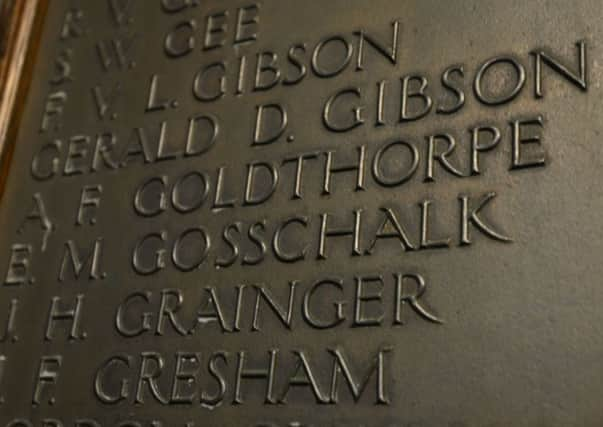Anthony Clavane: Migrants saw Britain as a place of refuge


He was asked to pick up a package of meat from a kosher butcher’s in Chapeltown, just outside Leeds city centre. When he arrived the butcher almost had a heart attack. He thought he was looking at a ghost.
Dad was ushered into the front room and shown a photograph on a mantlepiece of a soldier who was his double. The teary-eyed butcher told him the soldier had been his best friend, Myer Tompofski, a rifleman killed in the First World War. Myer was dad’s uncle and his photograph is currently on display at Kirkstall Abbey as part of an exhibition highlighting the role “people of different faiths in the local community” played during that terrible conflict.
Advertisement
Hide AdAdvertisement
Hide AdMy dad’s cousin, Mike Levy, has written a short piece based on eight letters sent to Myer’s parents and siblings, including my grandmother Mary and Mike’s mum Millie. It will be performed in Leeds next Sunday, the 100th anniversary of the end of the First World War.
There are many exhibitions, plays, poetry readings and the like taking place on the centenary of Armistice Day. In his project Pages of the Sea, the film director Danny Boyle is urging members of the public to etch silhouettes of war casualties on beaches. The arts are a wonderful way of commemorating the sacrifices made by so many of our descendants.
It is more important than ever to recognise, during a period when hate crime is on the increase, that people from different faiths and ethnic backgrounds fought for Britain in that war.
Far-right racists who claim that minorities can never be fully British do not like the fact that the centenary is being honoured in synagogues, mosques and temples as well as churches.
Advertisement
Hide AdAdvertisement
Hide AdTough. As Mike’s friend, Rabbi Laura Janner-Klausner, said: “The bullets on the battlefields did not discriminate between Sikhs, Muslims, Hindus, Christians, Jews and others.”
Hundreds of thousands of Muslim soldiers lost their lives during the conflict. 60,000 British Jews served in the armed forces and 3,500 were killed. My great-uncle was one of 176 men from the local Jewish community who died in the conflict. They were nearly all escapees from violent pogroms in eastern Europe and they saw Britain as a place of refuge.
I am very proud of that community and the contribution it has made to my home city. Leeds was built on the sweat of strangers: Jewish, Scottish, Irish, rural Yorkshire sweat. Factory hands, cobblers, flax-workers and tailors were all thrown together into one great big melting pot. This was a community which produced such famous names as Fanny Waterman, Michael Marks and Montague Burton.
Then, as now, these “aliens” were accused of unpatriotic leanings. One local newspaper article of the time referred to the “parade of flashily dressed young Jews swaggering along Briggate” as “our brave boys” met their deaths in the trenches in France. Some historians believe that article provoked a riot; in June 1917, a 3,000-strong mob rampaged through the cramped, terraced streets of the Jewish area, known as the Leylands, attacking families and vandalising and looting properties.
Advertisement
Hide AdAdvertisement
Hide AdMy great-uncle Myer had been born and brought up in the Leylands, a square mile of dark courtyards, hovels, dangerous passageways, narrow, cobbled streets and unsanitary back-to-backs. He received the Military Medal in March 1918, just six months before he fell on the opening day of the battle of the Canal du Nord. As Mike puts it, his letters “reveal a lively, funny, caring individual; a lost brother forever mourned by his siblings, an uncle I was never to know – though I am named after him. They allowed me, his nephew, a glimpse into a life cut short.”
The media got a bit overexcited recently when Boyle quit the new James Bond movie. Some journalists couldn’t understand why he had given up the most glamorous gig in showbiz for his Pages of the Sea project. But, as he said, he would rather devote his attention to “real heroes (not) fictional ones”. Like Private Tompofski of the West Yorkshire Rifles.